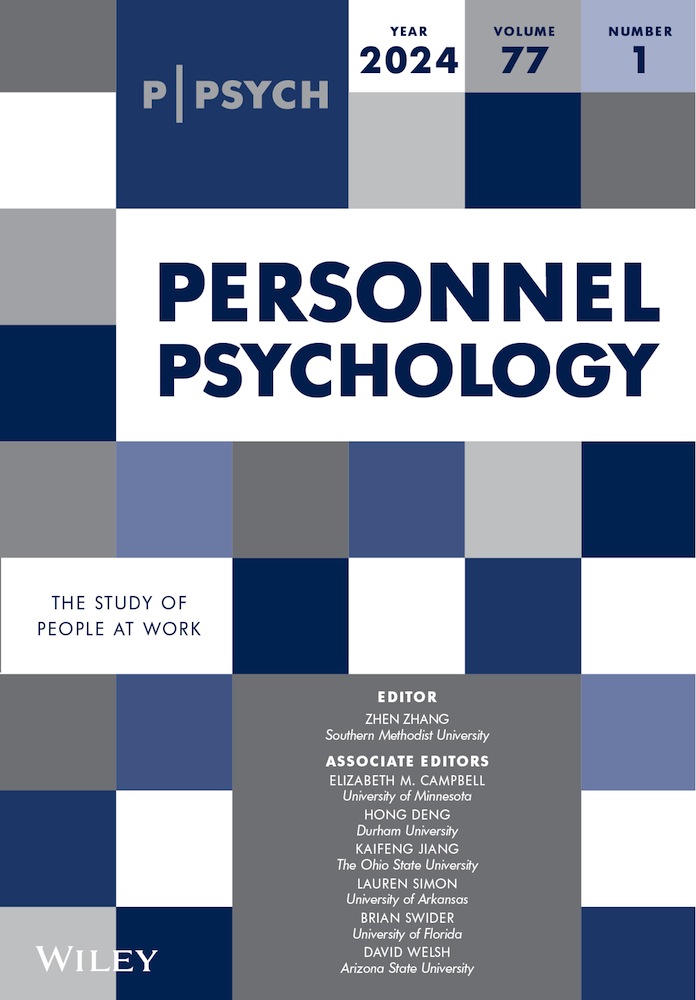There's no going back? The influence of prior entrepreneurial experience timing on voluntary turnover in post‐entrepreneurship wage employment
IF 6.4
2区 心理学
Q1 MANAGEMENT
引用次数: 0
Abstract
Abstract Despite the prevalent stereotype that former entrepreneurs are undesirable employees due to a high likelihood of quitting, little research has empirically verified its accuracy. With a growing population of former entrepreneurs in the workforce, it has become more important than ever to understand whether, when, and which former entrepreneurs may or may not be likely to quit their post‐entrepreneurship employment. We used a sample of nationally representative 20‐year data from Australia to examine how timing of prior entrepreneurial experience relative to a focal wage job relates to voluntary turnover via a serial mediation by entrepreneurial intention and turnover intention. Results showed that employees with entrepreneurial experience in their second most recent job spell were more likely to develop entrepreneurial intention and turnover intention in sequence, which, in turn, increased quitting risk relative to employees without entrepreneurial experience in the same job spell. However, we did not find evidence for such differences between employees with and without entrepreneurial experience in their most recent job spell. Moreover, the serial mediation effect holds among men but not women. These findings highlight the important role of timing in the relationship between of entrepreneurial experience and post‐entrepreneurship employment attitude and behavior. Theoretical contributions and practical implications are discussed.没有回头路了?创业经验时间对创业后工资就业中自愿离职的影响
尽管有一种普遍的刻板印象,认为前企业家是不受欢迎的员工,因为他们很有可能辞职,但很少有研究从经验上验证其准确性。随着劳动力中前企业家的人数不断增加,了解哪些前企业家可能会或可能不会退出创业后的工作,变得比以往任何时候都更加重要。我们使用了来自澳大利亚的具有全国代表性的20年数据样本,通过创业意向和离职意向的一系列中介,研究了相对于重点工资工作的先前创业经历的时间与自愿离职的关系。结果表明,具有创业经历的员工在最近的第二份工作中更容易产生创业意向和离职意向,这反过来又增加了同一工作期间没有创业经历的员工的辞职风险。然而,我们没有发现有和没有创业经验的员工在最近的工作经历中存在这种差异的证据。此外,序列中介效应在男性中存在,而在女性中不存在。这些发现强调了时间在创业经历与创业后就业态度和行为之间的关系中的重要作用。讨论了理论贡献和实际意义。
本文章由计算机程序翻译,如有差异,请以英文原文为准。
求助全文
约1分钟内获得全文
求助全文
来源期刊

Personnel Psychology
Multiple-
CiteScore
10.20
自引率
5.50%
发文量
57
期刊介绍:
Personnel Psychology publishes applied psychological research on personnel problems facing public and private sector organizations. Articles deal with all human resource topics, including job analysis and competency development, selection and recruitment, training and development, performance and career management, diversity, rewards and recognition, work attitudes and motivation, and leadership.
 求助内容:
求助内容: 应助结果提醒方式:
应助结果提醒方式:


